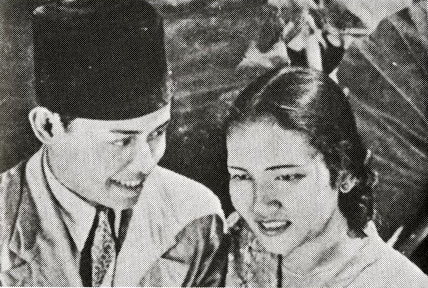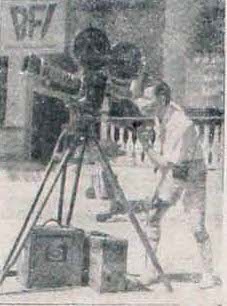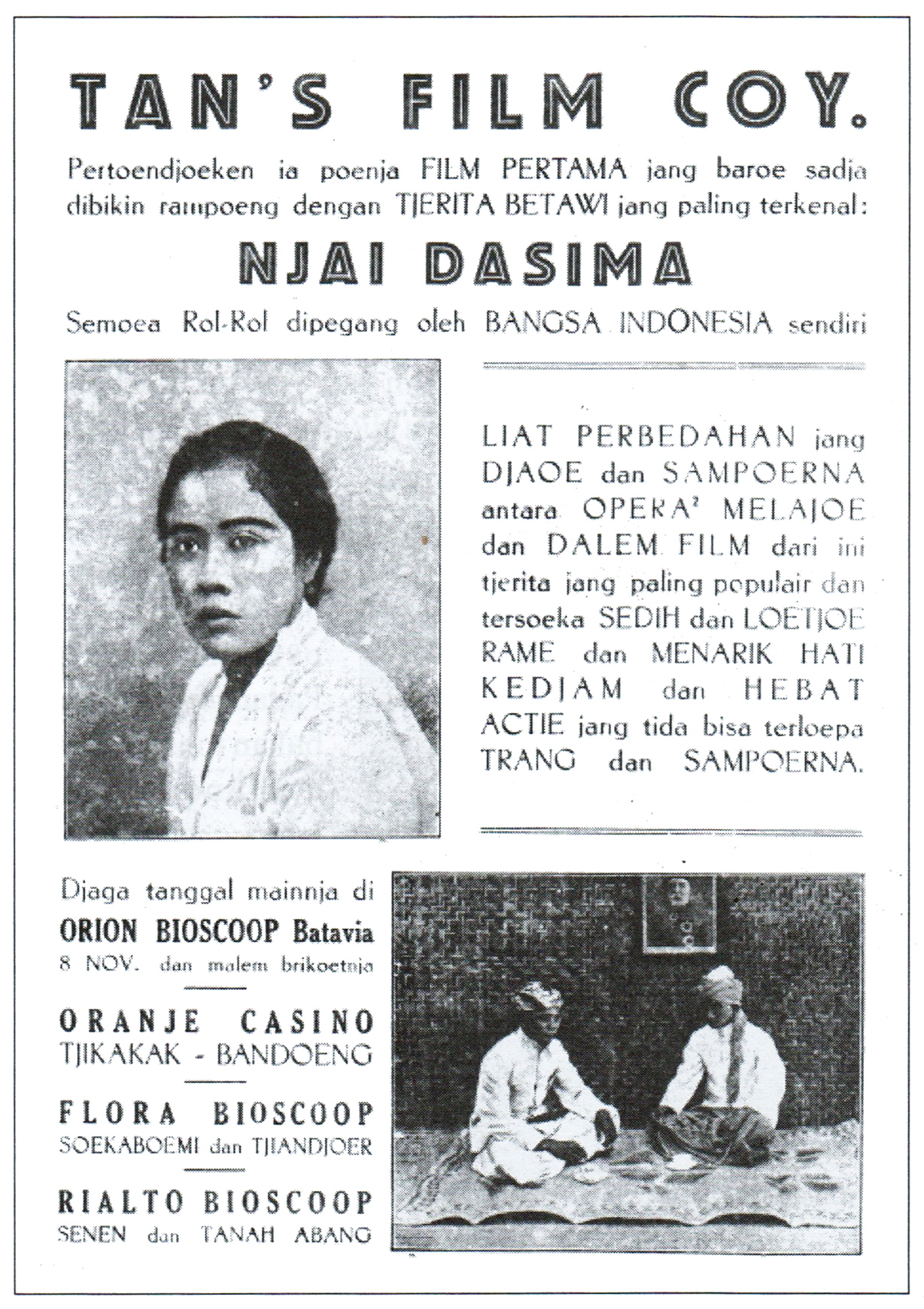|
Saeroen
Saeroen ( Perfected Spelling: Saerun; fl. 1920s–1962) was an Indonesian journalist and screenwriter. Born in Yogyakarta, he became a journalist after a time working at a railway station. By the mid-1930s he had established the daily ''Pemandangan'' with Oene Djunaedi and was writing editorials with the pen name Kampret. When the paper was dissolved, Saeroen drifted into the film industry as a writer, making his debut with Albert Balink's ''Terang Boelan'' (1937). Much of his later life was spent working with several minor publications. Early life and career Saeroen was born in Yogyakarta, Dutch East Indies, to a courtier (''abdi dalem'') and his wife. After failing to complete his schooling at two different elementary schools, during which time he worked cleaning horse-drawn carriages and delivering newspapers, he passed a written test equivalent to an elementary school diploma. He then went to Batavia (modern-day Jakarta) to work at a train station. After several months he was ... [...More Info...] [...Related Items...] OR: [Wikipedia] [Google] [Baidu] |
Harta Berdarah
''Harta Berdarah'' (; Indonesian for ''Bloody Treasure'') is a 1940 action film from the Dutch East Indies (now Indonesia). Directed by Rd Ariffien and R Hu for Union Films, the film was written by Saeroen. The film, which stars Zonder and Soelastri, tells of a young man who convinces a stingy hadji to be more charitable and, in the process, falls in love with the man's daughter. Released during Eid al-Fitr, ''Harta Berdarah'' was advertised as a "magnificent Indonesian action hit" and used Zonder's ''silat'' skills and Soelastri's fame as a ''keroncong'' singer to draw audiences. Reviews for the work were positive, with praise focused on its acting and story. Although ''Harta Berdarah'' was screened as late as 1944, as with most contemporary productions it is now likely lost. Plot In the village of Soekasari, Mardjan (Oedjang) is forcefully evicting people who are unable to pay their taxes to his boss, the landlord Hadji Doerachman (Moesa). Doerachman, though aware of this, is ... [...More Info...] [...Related Items...] OR: [Wikipedia] [Google] [Baidu] |
Asmara Moerni
''Asmara Moerni'' (; Perfected Spelling: ''Asmara Murni''; Indonesian for ''True Love'') is a 1941 romance film from the Dutch East Indies (now Indonesia) directed by Rd Ariffien and produced by Ang Hock Liem for Union Films. Written by Saeroen, the film followed a doctor who falls in love with his maid, as well as her failed romance with a fellow villager. Starring Adnan Kapau Gani, Djoewariah, and S. Joesoef, the black-and-white film was cast and advertised to cater to the growing native intelligentsia. Despite mixed reviews, it was a commercial success. As with most films of the Indies, ''Asmara Moerni'' may be lost. Plot After four years of doing his residency in Singkawang, Borneo, Dr. Pardi (Adnan Kapau Gani) returns to Java to open a practice. Before then, he goes to Cigading to visit his family and give them souvenirs. Upon arrival he is stunned to find that his family's maid Tati ( Djoewariah), who had been his childhood playmate, is now a grown and beautiful woman. ... [...More Info...] [...Related Items...] OR: [Wikipedia] [Google] [Baidu] |
Star Film (Dutch East Indies Company)
Star Film was a film production company in the Dutch East Indies. Established by Chinese-Indonesian businessman Jo Eng Sek and Chinese cameraman Cho' Chin Hsin in 1940, it produced five black-and-white films in 1940 and 1941; two of these were directed by Jo, and the remainder were directed by Wu Tsun. Another film was under production when the studio was closed following the Japanese occupation of the Dutch East Indies. Star helped establish the careers of actors such as S Waldy and Elly Joenara, and produced screenplays written by Rd Ariffien and Saeroen; its output, however, is probably lost. History Star Film was established by Jo Eng Sek, who had previous film experience as co-producer of ''Si Tjonat'' (1929), and Shanghai-based cameraman Cho' Chin Hsin; for much of the life of the company, Jo would take the role of producer while Cho' would be on camera. The company's headquarters were located at Prinsenlaan, Batavia (now Mangga Besar, Jakarta). The company released its fi ... [...More Info...] [...Related Items...] OR: [Wikipedia] [Google] [Baidu] |
Bajar Dengan Djiwa
''Bajar dengan Djiwa'' (; Perfected Spelling: ''Bayar dengan Jiwa''; Indonesian for "Pay with ne'sSoul") is a believed lost 1941 film from the Dutch East Indies (modern day Indonesia). Directed by R Hu and produced by Ang Hock Liem, it starred A Bakar, Djoewariah, O Parma, Oedjang, RS Fatimah, Soelastri, and Zonder. The story centers on two families torn apart by finances and clashes of personality. The third film produced by Union Films, ''Bajar dengan Djiwa'' featured many actors who had previously appeared in the company's works. It was released by February 1941. Advertisements emphasised the realism of the story, and reviewers praised the film's acting, romance, and humour. Screenings continued until at least 1943, more than a year after Union was closed following the Japanese occupation. Plot ''Bajar dengan Djiwa'' follows the interactions of several groups of people. Husband and wife Basuki (Zonder) and Suryati (Nji Soelastri) clash because of their different personalit ... [...More Info...] [...Related Items...] OR: [Wikipedia] [Google] [Baidu] |
Gagak Item
''Gagak Item'' (; Vernacular Malay for ''Black Raven'', also known by the Dutch title ''De Zwarte Raaf'') is a 1939 bandit film from the Dutch East Indies (now Indonesia) directed by Joshua and Othniel Wong for Tan's Film. Starring Rd Mochtar, Roekiah, and Eddy T. Effendi, it follows a masked man known only as "Gagak Item" ("Black Raven"). The black-and-white film, which featured the cast and crew from the 1937 hit ''Terang Boelan'' (''Full Moon''), was a commercial success and received positive reviews upon release. It is likely lost. Production ''Gagak Item'' was directed by brothers Joshua and Othniel Wong; filming the work in black-and-white, they also handled sound editing. It was produced by Tan Khoen Yauw of Tan's Film and starred Rd Mochtar, Roekiah, Eddy T. Effendi, and Kartolo. The Wongs and cast had first worked together on Albert Balink's 1937 blockbuster ''Terang Boelan'' (''Full Moon''), before joining Tan's Film in 1938 for the highly successful '' Fatima' ... [...More Info...] [...Related Items...] OR: [Wikipedia] [Google] [Baidu] |
Pemandangan
''Pemandangan'' was a daily Indonesian language newspaper published in the Dutch East Indies (or later Indonesia) between 1933 and 1958. It was one of the few local newspapers which was initially allowed to operate during the Japanese occupation of the Dutch East Indies. History The newspaper was first published on 8 April 1933 by journalist Saeroen. In the first few months after the first issue, the sales of the newspaper could not cover expenditures, and the newspaper received financial support from local plantation owner Oene Djoenaidi. Saeroen would write editorials in ''Pemandangan'' under the pen name "Kampret" (bat), but these editorials resulted in ''Pemandangan'' being censored by the Dutch East Indies government. It also ceased publication for a week between 17 and 24 May 1940, due to censorship. ''Pemandangan'' would continue to publish following the Japanese invasion of the Dutch East Indies, and was the only newspaper to continue publication during the early occupatio ... [...More Info...] [...Related Items...] OR: [Wikipedia] [Google] [Baidu] |
Terang Boelan
''Terang Boelan'' (; Indonesian for "Full Moon", ''Terang Bulan'' in the Perfected Spelling System) is a 1937 film from the Dutch East Indies (now Indonesia). Written by Saeroen, directed by Albert Balink, and starring Rd Mochtar, Roekiah and Eddie T. Effendi, ''Terang Boelan'' follows two lovers who elope after one is almost forced to marry an opium smuggler. The film was shot in the Indies and Singapore, and was partially inspired by the 1936 Hollywood film ''The Jungle Princess''. It was aimed at native audiences and included ''keroncong'' music, which was popular at the time, and several actors from Balink's previous work ''Pareh'' (1936). ''Terang Boelan'' was a commercial success in both the Indies and abroad, earning 200,000 Straits dollars in British Malaya. This success revived the faltering domestic film industry and inspired films aimed at Malay audiences in Malaya, creating a formula of songs, beautiful scenery and romance that was followed for decades afterwards. Th ... [...More Info...] [...Related Items...] OR: [Wikipedia] [Google] [Baidu] |
Pah Wongso Tersangka
''Pah Wongso Tersangka'' (Indonesian for ''Pah Wongso Becomes a Suspect''), also known under the Dutch title ''Pah Wongso Keert Terug'' (''Pah Wongso Returns''), is a 1941 film from the Dutch East Indies directed by Wu Tsun for Star Film. Saeroen's first work for the company, it is a sequel to the 1940 detective film '' Pah Wongso Pendekar Boediman'', and stars the social worker L. V. Wijnhamer, Jr (better known as Pah Wongso) as a man who comes under suspicion and must clear his name. This possibly-lost film was styled as a comedy. Premise Pah Wongso has come under suspicion and must clear his name. Production ''Pah Wongso Tersangka'' was directed by Wu Tsun for the Batavia- (now Jakarta-) based Star Film, owned by Jo Eng Sek. The film was a sequel to '' Pah Wongso Pendekar Boediman'', a detective film which was directed and produced by Jo Eng Sek, one of the owners of the Batavia (now Jakarta) based Star Film. The earlier film, a popular success, had been written to cash in on ... [...More Info...] [...Related Items...] OR: [Wikipedia] [Google] [Baidu] |
Oene Djunaedi
Oene Djoenaidi (3 March 1895 – 6 June 1966), better known in Indonesia as R.H.O. Djoenaidi, was an Indonesian businessman. He sponsored the ''Pemandangan'' newspaper and was active in early Indonesian press. Early life Djoenaidi was born on 3 March 1895. As a teenager, he studied Islam in Mecca, during which he became familiar with the Sarekat Islam (SI) and its leaders in Indonesia. By the age of 18, he had returned to Indonesia, to his home in Tasikmalaya, and joined the SI. Career Once he returned, Djoenaidi worked to manage his father's coconut plantation, and traded in textiles around West Java. He expanded the agricultural business to lemongrass and rubber, and became known with the moniker "Lemongrass King". He also started a publisher, Galunggung, in Bandung. In 1933, during a business trip to Batavia, he met journalist Saeroen who stayed in a hostel run by Djoenaidi's son, and he agreed to invest in Saeroen's newspaper ''Pemandangan''. Within ''Pemandangan'', Djoenaidi i ... [...More Info...] [...Related Items...] OR: [Wikipedia] [Google] [Baidu] |
Wong Brothers
The Wong brothers were three ethnic Chinese film directors and cameramen active in the cinema of the Dutch East Indies (now Indonesia). The sons of an Adventist preacher, the brothers – Nelson (1895–1945), Joshua (1906–1981), and Othniel (1908–1986) – received much of their education in the United States before going to Shanghai and establishing The Great Wall Productions. By 1927, Nelson had arrived in the Dutch East Indies and was working with Miss Riboet's Orion, a theatrical troupe. When its owner Tio Tek Djien suggested he make a film with the troupe's star, Nelson insisted that his family be brought to the Indies. Although this initial film was not realised, the brothers made numerous feature films with different studios under the banner Halimoen Film, starting with ''Lily van Java'' (1929). After a two-year hiatus, during which Nelson fell ill, Joshua and Othniel worked with Albert Balink and Mannus Franken to produce ''Pareh'', a commercial failure ... [...More Info...] [...Related Items...] OR: [Wikipedia] [Google] [Baidu] |
Tan's Film
Tan's Film was a film production house in the Dutch East Indies (modern Indonesia). Established by the brothers Tan Khoen Yauw and Tan Khoen Hian on September 1, 1929, its films were mostly targeted at native ethnic groups. Starting with '' Njai Dasima'' in 1929, the company released fifteen movies before ultimately being dissolved after the Japanese occupation. The Tans and the Wong brothers established Tan & Wong Bros in 1948 to continue this work. History First iteration Tan's Film Company was established by Tan Khoen Yauw and his brother Tan Khoen Hian on September 1, 1929. It was one of three studios established in the Dutch East Indies that year, together with Nansing Film Corporation and another Chinese-owned studio. Tan's established a large studio building on Defensielijn v.d. Bosch (now Bungur Besar Raya Street). It had several divisions, including costuming, filming, and decor. The Tans, who had been raised in Kwitang, Batavia (modern day Jakarta) and grown up in ... [...More Info...] [...Related Items...] OR: [Wikipedia] [Google] [Baidu] |
Ajah Berdosa
''Ajah Berdosa'' (Perfected Spelling: ''Ayah Berdosa''; Malay for ''The Sinful Father'') is a likely-lost 1941 film from the Dutch East Indies (now Indonesia) directed by Wu Tsun for Star Film. Starring M. Arief, S Waldy, Elly Joenara, and Soetijem, it follows a villager named Mardiman over a period of several years, in which he loses everything owing to his infatuation with a "modern" woman. Plot Through diligence and hard work, a young villager named Mardiman, has developed a successful career as a scribe. His wife, Warsiah, and her family have been unable to help him advance his career, as none of them have any influence. Not long after Warsiah gives birth to a son, Mardiman is promoted and asked to work in the city. There he becomes infatuated with a sophisticated city woman, one who is more "modern" than Warsiah. Mardiman leaves his wife and sick son so that he can be with this new woman, but soon spends all of his money trying to please her and treat her to a high-class li ... [...More Info...] [...Related Items...] OR: [Wikipedia] [Google] [Baidu] |






